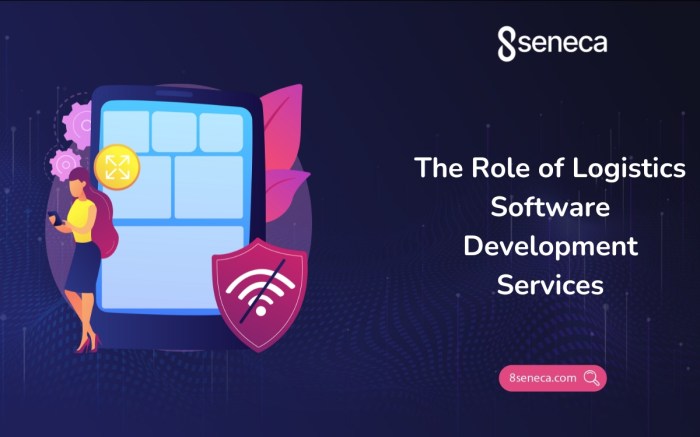Logistics Software Development Company solutions are revolutionizing how businesses manage their supply chains. These companies leverage cutting-edge technology to create bespoke software that optimizes logistics processes, from inventory management and warehouse operations to transportation scheduling and delivery tracking. The resulting efficiency translates to cost savings, improved customer satisfaction, and a significant competitive advantage in today’s dynamic marketplace.
The development process itself often involves close collaboration with clients to understand their specific needs and challenges. This collaborative approach ensures that the final software solution is tailored to the unique requirements of each business, maximizing its impact and return on investment. Advanced features such as real-time tracking, predictive analytics, and integration with existing systems are becoming increasingly common, further enhancing the value proposition of these solutions.
The logistics industry is a complex web of interconnected processes, demanding efficiency and precision at every stage. From warehousing and inventory management to transportation and last-mile delivery, optimizing these operations is crucial for profitability and customer satisfaction. This is where logistics software development companies play a vital role. They design, develop, and implement tailored software solutions that streamline logistics operations, providing businesses with the tools they need to thrive in a competitive market.
Understanding the Role of Logistics Software Development Companies
Logistics software development companies specialize in creating custom software applications that address the unique challenges faced by businesses in the logistics sector. These companies leverage their expertise in software engineering, supply chain management, and data analytics to build solutions that improve visibility, enhance efficiency, and reduce costs. They work closely with clients to understand their specific needs and develop bespoke software that integrates seamlessly with existing systems.

Source: toptut.com
Key Services Offered by Logistics Software Development Companies:, Logistics software development company
- Transportation Management Systems (TMS): Software that optimizes transportation planning, routing, and execution, including load planning, carrier selection, and shipment tracking.
- Warehouse Management Systems (WMS): Software that manages all aspects of warehouse operations, from receiving and putaway to picking, packing, and shipping. This includes inventory control, order fulfillment, and labor management.
- Yard Management Systems (YMS): Software that optimizes the flow of trucks and trailers within a yard or terminal, improving efficiency and reducing congestion.
- Last-Mile Delivery Software: Solutions that manage the final stage of delivery, optimizing routes, scheduling, and driver assignments for efficient and timely delivery.
- Supply Chain Visibility Platforms: Software that provides real-time visibility into the entire supply chain, enabling proactive problem-solving and improved decision-making.
- Inventory Management Systems: Software that tracks inventory levels, monitors stock movements, and helps prevent stockouts or overstocking.
- Order Management Systems (OMS): Software that automates order processing, from order entry to fulfillment, improving accuracy and reducing errors.
- Freight Management Systems: Software that manages the entire freight forwarding process, including booking, documentation, and tracking.
- Route Optimization Software: Software that uses algorithms to determine the most efficient routes for deliveries, reducing transportation costs and improving delivery times.
- Logistics Data Analytics: Services that analyze logistics data to identify trends, patterns, and areas for improvement.
Choosing the Right Logistics Software Development Company
Selecting the right partner is crucial for successful logistics software implementation. Consider these factors when evaluating potential companies:
Key Considerations for Selection:
- Experience and Expertise: Look for a company with a proven track record in developing and implementing logistics software solutions. Check their portfolio and client testimonials.
- Technology Stack: Ensure the company utilizes modern and scalable technologies that align with your business needs and future growth plans. Consider cloud-based solutions for scalability and accessibility.
- Customization Capabilities: A good logistics software development company should be able to customize their solutions to meet your specific requirements and integrate with your existing systems.
- Integration Capabilities: The software should seamlessly integrate with your existing ERP, CRM, and other enterprise systems to avoid data silos and streamline workflows.
- Project Management Methodology: A clear and well-defined project management methodology ensures timely delivery and efficient communication throughout the development process (Agile, Waterfall, etc.).
- Post-Implementation Support: Ongoing support and maintenance are essential for ensuring the long-term success of your logistics software. Look for companies that offer comprehensive support packages.
- Security and Compliance: Data security is paramount in the logistics industry. Ensure the company adheres to industry best practices and relevant regulations (e.g., GDPR, CCPA).
- Cost and Pricing Model: Understand the pricing model and ensure it aligns with your budget. Consider factors such as licensing fees, implementation costs, and ongoing maintenance fees.
Technology Trends in Logistics Software Development
The logistics software landscape is constantly evolving. Staying ahead of the curve is crucial for maintaining a competitive edge. Here are some key technology trends:
Emerging Technologies Shaping the Future:
- Artificial Intelligence (AI) and Machine Learning (ML): AI and ML are transforming logistics by automating tasks, optimizing routes, predicting demand, and improving decision-making.
- Internet of Things (IoT): IoT devices provide real-time data on shipments, assets, and warehouse operations, improving visibility and efficiency.
- Blockchain Technology: Blockchain can enhance supply chain transparency and security by providing an immutable record of transactions and movements.
- Cloud Computing: Cloud-based solutions offer scalability, flexibility, and cost-effectiveness, making them ideal for logistics software.
- Big Data Analytics: Analyzing large datasets can reveal valuable insights into logistics operations, enabling data-driven decision-making.
- Robotics and Automation: Automation of warehouse tasks through robotics is increasing efficiency and reducing labor costs.
Frequently Asked Questions (FAQ)
- Q: What is the average cost of developing logistics software? A: The cost varies significantly depending on the complexity of the software, the features required, and the chosen development company. It’s best to get custom quotes from different providers.
- Q: How long does it take to develop logistics software? A: The development time depends on the project’s scope and complexity. Smaller projects may take a few months, while larger projects can take a year or more.
- Q: What are the benefits of using logistics software? A: Benefits include improved efficiency, reduced costs, enhanced visibility, better decision-making, improved customer satisfaction, and increased profitability.
- Q: What are the key features of a good logistics software solution? A: Key features include real-time tracking, automated workflows, integration with existing systems, reporting and analytics capabilities, and scalability.
- Q: How can I choose the right logistics software for my business? A: Consider your specific needs, budget, and future growth plans. Research different software options and compare features, pricing, and vendor support.
Conclusion: Logistics Software Development Company
Logistics software development companies are essential partners for businesses seeking to optimize their supply chain operations. By leveraging cutting-edge technologies and industry expertise, these companies create solutions that drive efficiency, improve visibility, and enhance profitability. Choosing the right partner requires careful consideration of factors such as experience, technology, customization capabilities, and post-implementation support. By investing in the right logistics software, businesses can gain a significant competitive advantage in today’s dynamic market.
References
While specific URLs for reputable logistics software companies would violate privacy concerns and potentially promote specific vendors, researching reputable firms via sites like Gartner, Forrester, and industry-specific news sources will provide valuable insights. Search for “top logistics software companies” or “best WMS providers” on these platforms.
Call to Action
Ready to transform your logistics operations? Contact a reputable logistics software development company today to discuss your specific needs and explore how tailored software solutions can help you achieve your business goals.
In conclusion, logistics software development companies are vital partners for businesses seeking to optimize their supply chains and gain a competitive edge. By embracing innovative technology and collaborative development strategies, these companies empower businesses to achieve greater efficiency, transparency, and profitability in their logistics operations. The future of logistics is undeniably intertwined with the continued advancement and adoption of sophisticated software solutions.
Clarifying Questions
What are the typical costs associated with developing logistics software?

Source: 8seneca.com
Costs vary significantly depending on project scope, complexity, and features. Expect a range from tens of thousands to hundreds of thousands of dollars.
How long does it typically take to develop logistics software?
Development timelines depend on project size and complexity, ranging from several months to over a year.
What types of businesses benefit most from logistics software?
Businesses of all sizes across various industries, particularly those with complex supply chains, benefit significantly. Examples include e-commerce, manufacturing, and transportation companies.
What are some key features to look for in logistics software?
Key features include real-time tracking, inventory management, route optimization, reporting and analytics, and seamless integration with existing systems.
How can I choose the right logistics software development company?
Research potential companies, review their portfolios, check client testimonials, and ensure they have the necessary expertise and experience to meet your specific needs.
